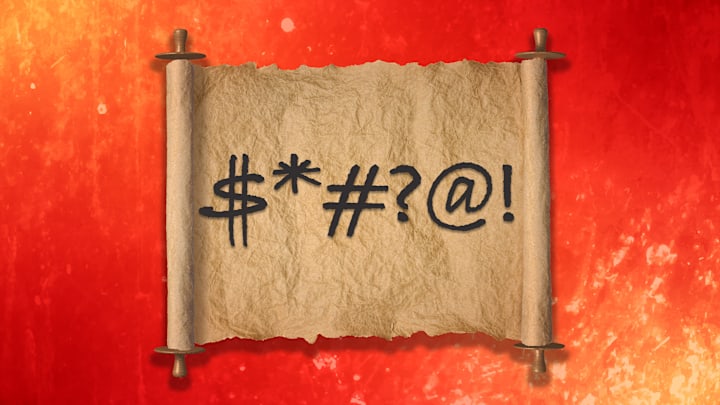For as long as there have been words, there have been impolite words. The first recorded use of the word fart, for example, might date back to the 11th century, when it popped up in The Antwerp-London Glossaries (“Pedatio, feorting”). If that’s the case, that would make fart potentially the oldest known rude word.
According to the book Holy Sh*t: A Brief History of Swearing, “People sometimes refer to obscenities as ‘Anglo-Saxon’ words … Actually, only arse, shit, fart, and bollock really date from the Anglo-Saxon, or early medieval, era—our other obscenities are all of more recent descent.” (Turd sometimes makes that Anglo-Saxon list, too.) And these words have not always appeared in a cursing context.
For instance, the OED’s first citation for shit—which derived from Old English and ultimately Germanic words meaning “dung”—dates back to the Old English medical text Bald’s Leechbook, where it referred to diarrhea. The word first started to be used derogatorily in the 16th century, specifically to talk about “An offensive or despicable person (usually a man); a person (usually a man) whose behaviour is regarded as obnoxious,” according to the OED.
As for the more modern four-letter words that still have the power to offend? They took a more circuitous route to find their way out of our mouths, and into our language.
Apart from its potential use in place names, surnames, and bynames, cunt shows up in the 14th century, when it was a word with an unclear history for female genitalia . It may derive from a not-well-attested Old English word, or it might be a borrowing from a different Germanic language. By the 17th century, though, it had become coarse slang, and has been provoking outrage ever since.
Fuck, however, has referred to sexual intercourse since pretty much the beginning (and, as may be the case with cunt, it’s probably borrowed into English from another Germanic language). In 2015, British historian Paul Booth discovered what is believed to be the first use of the word fuck in a sexual/sweary context when he found a court document from 1310 that contained the name Roger Fuckebythenavele, which is believed to be a coded insult. (“Although it is just possible that the name means ‘strike upon the belly,’” Booth said, “I feel there can be no doubt that the word ‘fuck’ as employed in this name … has the sexual connotation.”) Among its earliest uses according to the OED occurred around 1513, in a poem by William Dunbar:
“He clappit fast he kist and chukkit
As with the glaikis he wer ouirgane
Yit be his feirris he wald haue fukkit
Ye brek my hart my bony ane.”
The OED also notes a slightly earlier usage in a poem circa 1500—“Non sunt in cœli, quia gxddbov xxkxzt pg ifmk.” The first part is in Latin, but the second part is thought to be coded and pseudo-Latinized English. When decoded (which requires keeping in mind that certain differences with the Latin alphabet of the period, like w being two u’s and that u/v and i/j hadn’t been split), the cipher produces “fuccant uuiuys of heli,” which translates as “They [the monks] are not in heaven because they fuck the wives of [the town] Ely.” (Wife didn’t necessarily mean “married woman” at this time.) Whether the profanity was disguised because the word itself was objectionable or because there was concern over the accusation against the monks is an open question. The OED’s first citation of fuck as an interjection “Expressing anger, despair, frustration, alarm” is 1929 (though there’s also debate whether a 1528 usage—“O d fuckin Abbot”—might be an intensifier or just a reflection on the abbot’s love life).
Now that you know how old some of our oldest curse words are, check out some dirty terms—including dildo, twat, and boner—with additional meanings that aren’t dirty at all, and learn about words that sound dirty but actually aren’t.
